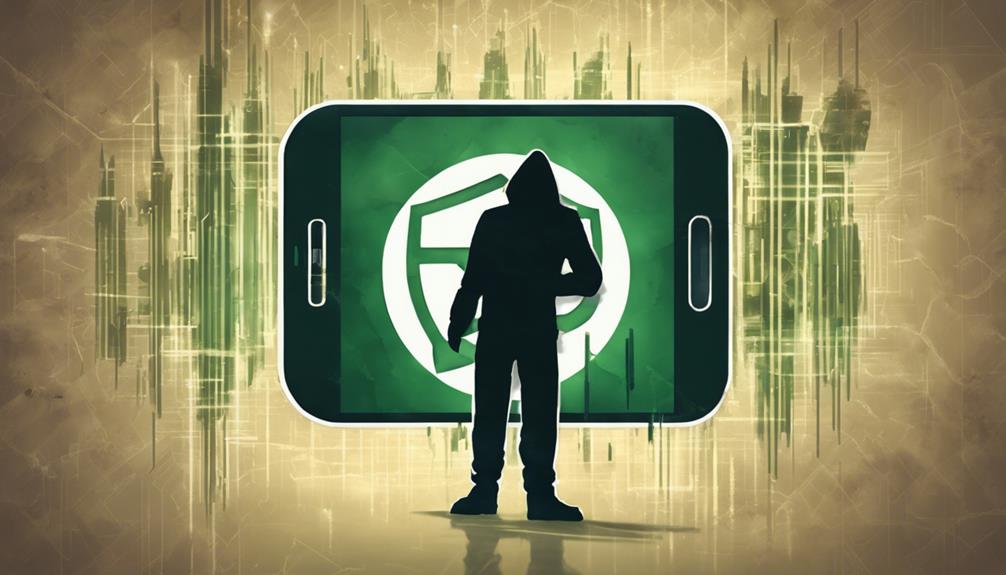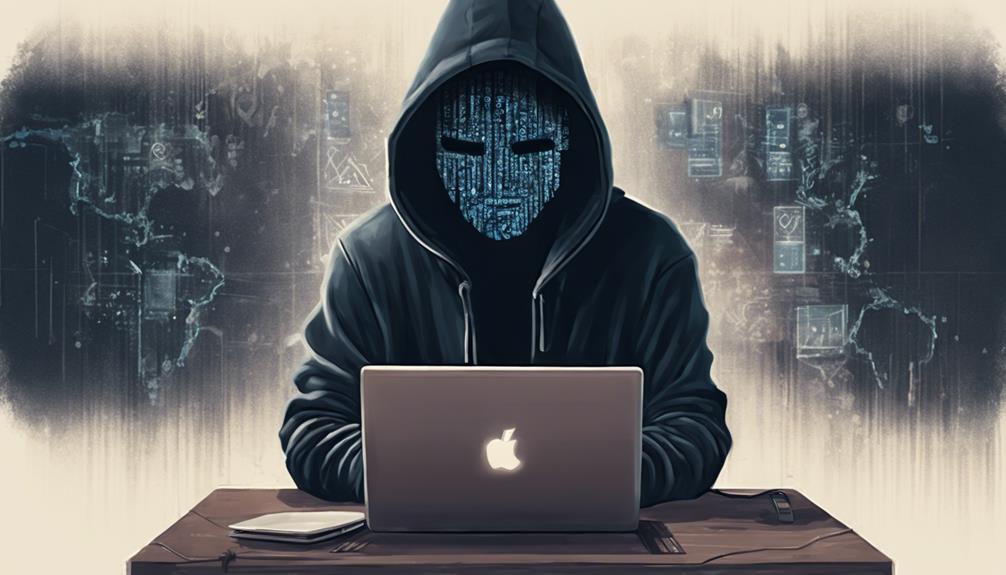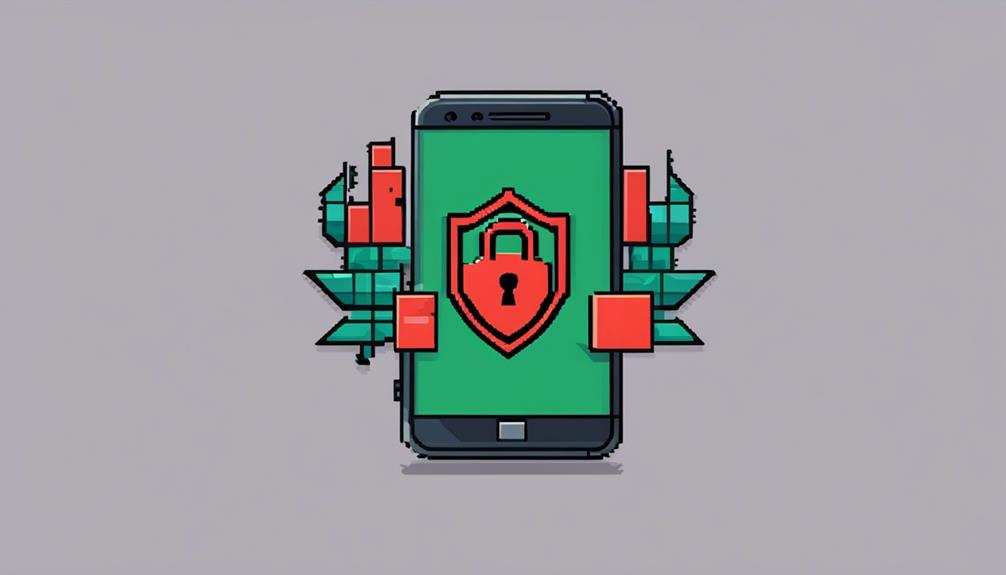WhatsApp is safe from hackers due to its robust security features. It utilizes end-to-end encryption for messages, calls, and photos, ensuring only the sender and recipient can access communication content. Two-step verification adds an extra layer of protection, requiring a verification code along with a password. Weak passwords increase vulnerability to hacking attempts, emphasizing the need for strong password practices. Users should be vigilant against phishing scams, spyware, and unauthorized access via WhatsApp Web. Implementing enhanced security measures like two-step verification and regular updates enhances protection. For further insights on safeguarding personal information on WhatsApp, explore account protection measures and potential vulnerabilities.
Key Takeaways
- Utilizes end-to-end encryption for secure communication.
- Two-step verification adds extra account protection.
- Weak passwords increase vulnerability to hacking attempts.
- Stay vigilant against phishing scams for added security.
- Regularly update WhatsApp for latest security patches.
WhatsApp End-to-End Encryption
With its utilization of end-to-end encryption, WhatsApp provides a secure platform for protecting messages, calls, and photos from potential hackers. This encryption method guarantees that only the sender and recipient have access to the content of their communication, greatly enhancing security.
By employing end-to-end encryption, WhatsApp prevents unauthorized access and message interception during transit, safeguarding user data effectively. Each message is secured with a unique encryption key, adding an additional layer of protection to the platform.
This encryption mechanism plays an essential role in maintaining the confidentiality and integrity of the communication within the app, making it challenging for hackers to breach the security measures in place. WhatsApp's commitment to encryption not only secures messages but also helps in fortifying user data against potential hacking attempts.
This robust security feature underscores the platform's dedication to providing a safe and private communication environment for its users.
Importance of Two-Step Verification

Two-step verification is an essential security feature that adds an extra layer of protection to your WhatsApp account. By requiring a verification code along with your password, it greatly reduces the risk of unauthorized access and potential hacking incidents.
Setting up two-step verification is a proactive measure that enhances the security of your personal information on the platform.
Two-Step Verification Benefits
Implementing two-step verification on your WhatsApp account is crucial for enhancing security and safeguarding your personal information. This additional layer of security requires a unique pin along with your password, greatly reducing the risk of unauthorized access to your account.
By enabling two-step verification, you create a barrier that can prevent hacking attempts and secure your conversations from potential breaches. This feature is highly recommended to boost overall security and guarantee that your personal data remains confidential.
In the digital age where cyber threats are prevalent, setting up two-step verification on your WhatsApp account is a proactive step towards securing your information and maintaining control over who can access your account.
Don't overlook the importance of this security measure in today's interconnected world, where protecting your online presence is paramount.
Enhancing Account Security
How essential is the implementation of two-step verification for enhancing the security of your WhatsApp account?
Two-step verification plays a fundamental role in safeguarding your WhatsApp account from potential security risks and unauthorized access by adding an extra layer of protection beyond just your phone number. When you enable two-step verification, you greatly enhance the privacy and security of your account, making it challenging for hackers to access your WhatsApp data.
Here are four reasons why enabling two-step verification is important to protect users:
- It adds an additional security measure to your account, requiring a unique PIN for access.
- Two-step verification helps prevent unauthorized individuals from easily gaining access to your messages, photos, and calls.
- Enabling this feature is a simple process that significantly enhances the overall security of your WhatsApp account.
- It is a recommended security measure to safeguard your personal information and communications from potential hacking attempts.
Risks of Weak Passwords

Weak passwords pose a significant risk to the security of WhatsApp accounts, making them vulnerable to hacking attempts.
Common or easily guessable passwords increase the likelihood of unauthorized access, potentially leading to breaches of sensitive information.
It is imperative to prioritize password strength and complexity to mitigate the risk of unauthorized intrusion and safeguard your personal data effectively.
Password Security Importance
What risks do weak passwords pose to the security of WhatsApp accounts?
Weak passwords can make WhatsApp accounts vulnerable to hacking attempts, jeopardizing personal information.
To enhance password security and protect against unauthorized access, consider the following:
- Hackers Target Weak Passwords:
Hackers often exploit weak passwords to gain unauthorized access to WhatsApp accounts.
- Importance of Strong Passwords:
Utilizing strong, complex passwords greatly reduces the risk of hackers infiltrating your account.
- Two-Step Verification:
Enabling Two-step verification adds an extra layer of security, requiring additional verification beyond just a password.
- Regular Password Updates:
Regularly updating passwords and avoiding common phrases or easily guessable information is essential for maintaining robust account security.
Potential Breach Vulnerability
The susceptibility of WhatsApp accounts to potential breaches greatly increases when passwords lack complexity and strength. Weak passwords make it easier for hackers and scammers to gain unauthorized access to accounts, potentially leading to the compromise of sensitive information.
Phishing attempts, where individuals are tricked into revealing their login credentials through deceptive means, often target users with weak passwords. To mitigate this risk, users are advised to create strong, unique passwords that are not easily guessable.
Two-factor authentication, which requires users to provide a verification code sent to their mobile device in addition to their password, adds an extra layer of security against unauthorized access.
Protecting Against Phishing Scams

To safeguard your personal information on WhatsApp, it is important to be vigilant against phishing scams, a common tactic employed by hackers to steal sensitive data. Here are some key steps to protect yourself:
- Avoid clicking on suspicious links:
Hackers often use enticing links to trick users into revealing personal information. Be cautious and refrain from clicking on any links from unknown or untrusted sources.
- Enable two-step verification:
Adding an extra layer of security through two-step verification can prevent unauthorized access to your WhatsApp account, enhancing protection against phishing attacks.
- Report suspicious activity:
If you encounter any messages or activity that seem suspicious, promptly report it to WhatsApp support. By doing so, you can help prevent others from falling victim to phishing scams.
- Regularly review app permissions:
Check and adjust your app permissions and settings regularly to make sure that your account is secure and not vulnerable to phishing attempts. Stay proactive in maintaining your account's security to mitigate risks posed by hackers.
Potential Vulnerabilities to Watch For

Social engineering attacks, unauthorized access through WhatsApp Web, spyware threats, and Dark Web activities present potential vulnerabilities that users should be vigilant about.
Social engineering tactics manipulate users into divulging sensitive information, compromising their accounts.
Unauthorized access via WhatsApp Web can lead to account breaches through vulnerabilities in the web interface.
Spyware poses a significant threat by silently monitoring and collecting user data without consent.
On the Dark Web, malicious actors may sell stolen WhatsApp account details or offer hacking services, putting users at risk.
Vigilance is important to detect suspicious activities, phishing attempts, and unauthorized logins, which can help prevent hacking incidents.
Users should employ secure verification methods, regularly check for unusual device access, and be cautious when exchanging sensitive information via messaging.
Staying informed about potential threats and practicing good cybersecurity habits are essential in safeguarding WhatsApp accounts from these vulnerabilities.
Enhanced Security Measures for Users

Implementing enhanced security measures can greatly strengthen users' protection against potential hacking threats on WhatsApp. To safeguard personal information and enhance security, users can take the following steps:
- Two-step verification: By enabling this feature, users add an extra layer of security to their accounts, making it more important for hackers to gain unauthorized access.
- End-to-end encryption: This feature ensures that messages, calls, and photos are securely encrypted, preventing hackers from intercepting and reading sensitive information.
- Regularly updating WhatsApp: Keeping the app up to date ensures that users have the latest security patches, which are essential in preventing hacking attempts.
- Avoiding phishing attempts: Users should be cautious of suspicious links and refrain from sharing personal information to reduce the risk of falling victim to hackers attempting unauthorized access.
Safeguarding Personal Information

Enhancing the security of personal information on WhatsApp is crucial in safeguarding user data from potential hacking threats. To keep your WhatsApp safe, it is essential to take proactive steps to protect your account.
Utilize strong, unique passwords that are not easily guessable and enable two-step verification for an added layer of security.
Avoid sharing sensitive details such as your phone number or verification codes that could be exploited by hackers to gain unauthorized access to your account.
Regularly review the linked devices associated with your WhatsApp to make sure that only trusted devices have access.
Be vigilant against phishing attacks by refraining from clicking on suspicious links or messages that could compromise your WhatsApp privacy.
Frequently Asked Questions
Are There Any Dangers in Using Whatsapp?
When considering the safety of using WhatsApp, it is essential to be mindful of potential dangers. Users must remain vigilant against cybersecurity threats such as phishing scams and weak passwords to guarantee the security of their accounts.
Can Someone Hack My Whatsapp if I Reply to a Text?
Replying to a text on WhatsApp alone does not make your account vulnerable to hacking. However, hackers may exploit vulnerabilities through phishing links. Avoid clicking suspicious links, share minimal personal information, and enable two-step verification for enhanced security.
What Are the Signs That My Whatsapp Is Hacked?
Signs that your WhatsApp is hacked include new logins you didn't authorize, unexplained profile changes, unfamiliar contacts or messages, unexpected password change notifications, and unusual phone activity like hidden apps or excessive battery drain. Stay vigilant for these indicators.
Why Would Someone Use Whatsapp Instead of Texting?
When weighing WhatsApp against traditional texting, users embrace its enhanced security with end-to-end encryption, multimedia sharing capabilities, and two-step verification for added protection. These features make WhatsApp a preferred choice for secure and efficient communication.
Conclusion
To sum up, the security measures implemented by WhatsApp greatly reduce the risk of unauthorized access by hackers. These measures include end-to-end encryption and two-step verification. However, users must remain vigilant against potential vulnerabilities, such as weak passwords and phishing scams.
By taking proactive steps to safeguard personal information and staying informed about security best practices, individuals can mitigate the threat of cyber attacks on the platform.
Stay safe, stay secure.









